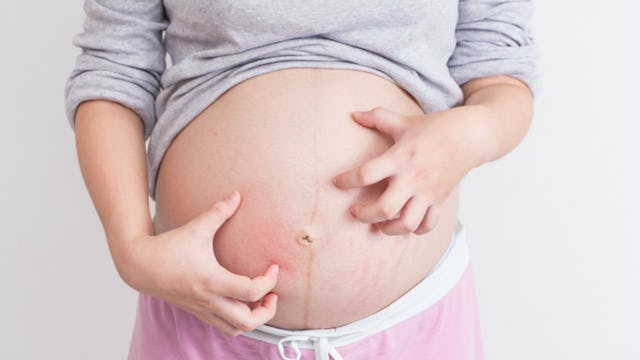The Irritating, Itchy, and Often Dangerous Pregnancy Condition No One Knows About

“I was on bed rest and every evening, my hands and feet were super, super itchy, like ‘this feels like fire ants, about to draw blood’ levels of scratching,” says Megan, a mom of 5-year-old twins from Connecticut.
“Right around 36 weeks, I had a really bad night where all of a sudden my whole body was out of control itchy. Like on fire. Even the palms of my hands were driving me crazy. I scratched all night, couldn’t stop,” Melodie, a mom of three from Ohio, tells Scary Mommy.
Itch, itch, itch. Scratch, scratch, scratch. Just hearing stories like this make us all itchy AF, amiright?
But these moms didn’t have bug bites, poison ivy, eczema, or any kind of rash you’ve probably ever heard of. They both suffered from a pregnancy complication called intrahepatic cholestasis. And if you’ve never heard of it, you are not alone. I didn’t know it was a thing while I was pregnant, but only learned about it years later, after a girlfriend of mine had it.
According to the National Institutes of Health (NIH), intrahepatic cholestasis is a rare complication of pregnancy involving a disorder of the liver. And although it typically only affects 1% of pregnant women, it can actually be quite serious. If untreated, the condition can result in premature birth for babies, or even stillbirth. So, not something to be taken lightly at all.
What happens is this: For reasons not entirely known, a pregnant mother’s liver starts to dysfunction. Bile is no longer properly released from the liver, and instead builds up in the mother’s bloodstream, causing those telltale itchy symptoms. The condition usually manifests in the last trimester of pregnancy, but women have presented with symptoms as early as the first trimester.
The strange thing is that the itchiness is not accompanied by any kind of rash. And although some mothers only present with mild to moderate symptoms, most mothers who experience it characterize it as much more than just any ordinary kind of itching. It happens mostly at night, and on the soles of the feet and palms of the hands. It can get so bothersome that you lose sleep. It’s just plain itchy as all hell—and often gets worse over time, until it becomes apparent that something is definitely wrong.
Jennifer, a mom of two from Wisconsin, told Scary Mommy about her experience with the condition.
“I didn’t think much of it at first, but the soles of my feet also started itching, and the itching intensified,” said Jennifer. “And of course, the more you scratch, the more you itch. A cursory web search showed that itching was a somewhat normal experience during pregnancy and only very, very seldom could be a symptom of something more serious.”
At first, when Jennifer conferred with her OB, she was told that it was unlikely to be anything serious. He told her to take a soothing bath, along with some anti-itch meds. But when nothing helped and the itching only got worse, Jennifer had to call her doctor back and ask to be tested for the condition.
“Another day or so went by, and none of the things my doctor suggested were helping,” said Jennifer. “I Googled what the more serious condition was— found out it was called cholestasis, and found a web site called Itchy Moms, which talked about the condition and what to be mindful of. That spurred me to call my doctor back, and ask to be tested for the condition.”
When the results came back positive, it was a relief indeed, and Jennifer was given medicine to keep the condition stable until she was able to safely deliver her baby. Because the condition is a potential danger to babies, doctors often need to monitor the baby closely, and decide—based on each individual case—when and if an early delivery is advisable.
In Jennifer’s case, once her baby’s lungs were mature enough at 37 weeks, she was induced. “The reason for induction is that at 37 weeks the cases of infant mortality in utero spike, and we obviously wanted to deliver before that time,” she shared.
The good news is that as soon as your baby is delivered, your symptoms disappear, and your baby is generally just fine. But the problem with the disorder is that until then, your baby is potentially at risk, and the stress of not knowing what will happen can be anxiety-inducing indeed.
Additionally, not all women even know that this condition is a thing. And it can be confusing, too, because pregnancy comes with a ton of weird symptoms that are innocuous. Even some extra itchiness—as hormones change, and as skin stretches—can be totally normal. That’s why it’s always, always good to ask questions, and advocate for yourself if your gut tells you that something doesn’t seem right.
“I think my advice would be to always trust your gut— if something feels off, say something,” Jennifer advises. “Don’t ever be afraid that you are annoying your doctor or being too pushy […] There were literally NO other symptoms in my case OTHER than itchiness. It’s scary to think that, had I not pushed the matter, it could have been overlooked.”
YES. We all need to be our own advocates. We shouldn’t freak out about the littlest things, but we all need to be educated about how our bodies work, including what can potentially go wrong. Intrahepatic cholestasis is certainly a rare thing, but it’s serious enough that we all need to be aware of the symptoms and compilations—and most of all, never be afraid to relay any concerns to our healthcare providers.
This article was originally published on